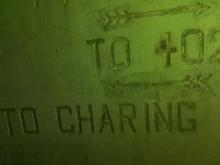70 years ago: Hong Kong's wartime diaries
22 Jun 1944, Barbara Anslow's diary
Submitted by David on Mon, 2012-04-09 15:39Book / Document:Date(s) of events described:Thu, 22 Jun 1944Mr M Flaherty died of Hodgkin's disease. Much fuss over his coffin, apparently made from a questionable source (all furniture now being strictly communal - there was a Tribunal case over it, against L. Nielson). Mrs Flaherty Chinese, she spent some time in gaol but is out now.
No births during June.
Still rehearsing 'Peter Pan'.
22 Jun 1944, R. E. Jones Wartime diary
Submitted by Admin on Wed, 2014-05-21 15:49Book / Document:Date(s) of events described:Thu, 22 Jun 1944Rain, heavy low cloud.
Roll-call 8am.
Longest day.
No rations arrived.
Paper playing up the German “new weapon”. Elba evacuated & four more places in Finnland. Obvious progress being made in France with Germans saying Cherbourg & peninsula not really worth much strategically. Total absence of Pacific or Burma news.
Ground rice, chopped wood.
Saw Steve after concert.
(Shall I be seeing you two soon Marj darling?)
22 Jun 1944, Chronology of Events Related to Stanley Civilian Internment Camp
Submitted by brian edgar on Thu, 2015-07-09 17:22Book / Document:Date(s) of events described:Thu, 22 Jun 1944Death of M. J. Flaherty of the Hong Kong Police from Hodgkin's lymphoma.
Source:
Barbara Anslow Diary entry June 22, 1944
George Wright-Nooth, Prisoner of the Turnip Heads, 1994, 214-215.
Note:
Wright-Nooth, supported by Eric MacNider's diary, places the death on June 23. However, I have followed Barbara Redwood's dating, as she was working at Tweed Bay Hospital, and because R. E. Jones's diary tells us that Flaherty was buried on June 23, and, given the fuss about his coffin referred to by Barbara, it seems certain he died the day before.
Wright-Nooth tells us that Flaherty was unwilling to be buried in the usual Stanley way: wrapped in a sack and placed in a coffin with a re-usable sliding bottom to avoid wasting precious wood. His wife got L. R. Nielson to go round the camp buying up doors with money she'd made from the black market. He bought more doors than necessary and kept the surplus for firewood. A special coffin was made, Flaherty's stiffening body was forced into his best suit and placed in it for several hours for friends to pay their respects. All this seems to have been done during June 22, and the burial took place on the 23rd.
As doors were deemed communal property and not therefore sellable, Nielson appeared before a camp tribunal. I read about his case in HKRS163 1-303, and, because I didn't at that time understand the background, failed to make a note of the verdict. But I think he was acquitted.

